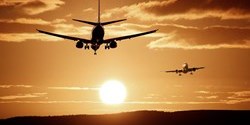The air transport sector expects profits to fall by 21% by 2019 due to the slowdown in air freight, commercial wars and the high price of fuel, which represents a quarter of its operating expenses.
The airlines, meeting on Sunday and Monday in Séul to hold their annual general assembly, also face the consequences for their image of the accidents of Ethiopian Airlines on March 10 (157 dead) and Lion Air on October 29. In Indonesia (189 dead), which led to the provisional flight ban of the Boeing 737 MAX.
“In 2018, there was a major accident for every 5.4 million flights,” said Alexandre de Juniac, director general of the International Air Transport Association (IATA), who called on builders and civil aviation regulatory authorities. restore confidence in aircraft certification.”
“A process that is extremely safe and based on a leading certification authority, unanimously and unreservedly recognized by the other authorities, is necessary to avoid the multiplication of certification authorities, which would complicate the system considerably and uselessly”, he said.
A failure in the MCAS stabilization system of the Boeing 737 MAX, the latest product of the US manufacturer, is considered the cause of the two accidents. There have also been criticisms of the certification procedures of the federal aviation agency (FAA).
In the financial area, the sector must generate around 28,000 million dollars in profits in 2019, according to IATA, which revised its forecasts to a 21% decrease.
But despite a less favorable context, the sector has recorded profits for the tenth year in a row, according to the international press.
The demand of the passenger sector remains “solid”, but the freight sector suffers the trade war between China and the United States and the high price of fuel. The price of the barrel has increased 27.5% with respect to 2017, according to IATA.
“The cargo sector is the first activity affected” by the trade war between the two economic giants, says the agency.
The Asia-Pacific region, which represents around 40% of the world’s air freight transport, has been affected by commercial tensions, as well as by the price of fuel, which reduced the net profit forecasts of the airline industry. 7.600 million to 6.000 million dollars.
The environment is another great challenge for the air transport industry, in an emergency context of a movement in Sweden, the “flight shaming” (the embarrassment of traveling by plane) that encourages travelers to use a different means of transport of the plane, accused of being one of the main responsible for climate warming.
“If a response is not provided, this feeling of” concern about aircraft emissions “will grow and spread,” admits De Juniac, after having listed the measures taken since 2009 by aviation to reduce those emissions.
The sector represents around 2% of the global emissions of carbon dioxide (CO2) according to the International Civil Aviation Organization (ICAO).
Stop taking the plane or reduce travel “would have serious consequences for employment and the economy around the world, it would be a step back to an isolated society that would be diminished, poorer and more constrained” fears the director general of IATA.
Source: Arecoa
